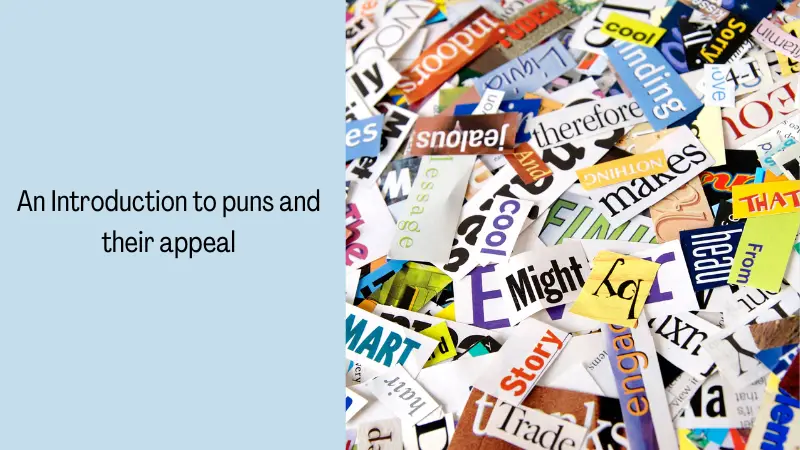Puns, or the clever play on words and sounds, have been making people groan and giggle for centuries. Though often dismissed as silly or lowbrow humor, the art and psychology of crafting great puns is complex. This article will unpack what makes puns tick, the different types, tips for creating them, famous examples, and how puns continue to evolve in our digital age.
An Introduction to puns and their appeal
A pun is a form of wordplay that deliberately exploits ambiguities within a language for a humorous or rhetorical effect. Puns leverage words that have multiple meanings (homographs) or sound alike but have different meanings (homophones), surprising the reader or listener.

Puns have been around for a very long time. One of the earliest recorded puns comes from an ancient Babylonian play on words more than 3,500 years ago. “Puns run through literature like capillaries through flesh,” writes Alaska Quarterly Review editor Ronald Wallace. From Shakespeare to rap lyrics, puns help writers and speakers convey color, wit, and insight succinctly.
So why do puns appeal to us? Linguistics and psychologists have theorized that humor arises when there is a resolution of incongruity or conflict between expectations and reality. Puns set up that incongruity for us in an efficient, often surprising way. Our delight comes from that aha moment when we resolve the double meanings.
The Psychology of Humor and Wordplay
Humor is inherently psychological and cultural. Things we find funny are shaped by our experiences, backgrounds, and even age. Puns leverage gaps in our expectations to elicit chuckles and groans.
According to noted linguist Neil Postman, “All humor is a play on form…laughing at something implies a sudden perception of incongruity – seeing something where it is unexpected.” Puns create that incongruity and resolution.
Some research also indicates puns and humor can increase creativity, offer cognitive benefits, and improve mood. It acts as a mental exercise. Punning riddles were common in ancient cultures as teaching tools to increase mental flexibility. Modern studies back this up. Creating puns activates many parts of the brain.
Types of Puns
While there are endless variations, common pun types include:
Homographic puns – Words spelled the same but with different meanings (e.g. comic Ray Romano’s joke “I used to work in a blanket factory, but it folded”).
Homophonic puns – Words that sound the same but have different spellings and meanings (e.g. “She had a photographic memory but never developed it”).
Compound puns – Pun created by a phrase or word intentionally split into different parts (e.g. “Where do mathematicians go on weekends? To a math convention.”)
Visual puns – Images that convey two different meanings at the same time.
Recursive puns – Puns within puns within puns.
Tips for Creating Great Puns
Like any good comedy or writing, great puns take skill and practice. Here are some tips:

- Leverage homophones – Homophonic puns substitute a word that sounds the same (e.g. to/two/too). This offers lots of possibilities.
- Flip idioms or cliches – Twisting common expressions can create surprising new puns (e.g. “The carrots were just dangled in front of me as motivation”).
- Mine categories – Related words around a theme (legal, medical, etc) make fertile territory for puns.
- Use proper names – Puns with people’s names can be very effective (e.g. cheese jokes for someone named Brie).
- Create pun chains – Puns that build on each other in a sequence (“Let’s just hope this weather forecast isn’t too…precipitous! Though it rain or shine, I’ll weather whatever comes our way.”)
- Use contrasts – Puns presenting opposites or extremes can heighten the incongruity.
- Make reference puns – Puns referencing pop culture or famous figures work well for certain audiences.
The more you play with language and listen for word associations, the easier it becomes to create puns on the fly.
Famous Pun Examples
Puns have been used by famous writers, advertising agencies, comedians, and more to grab attention and convey meaning in clever ways. Here are a few legendary examples:
- “Astronomers got tired watching the moon go round the earth for 24 hours. They decided to call it a day.” – Nike Adams
- “I tried to catch some fog earlier. I mist.” – Anonymous
- “You can tune a guitar, but you can’t tuna fish. Unless you play bass.” – Douglas Adams
- “Old accountants never die. They just lose their balance.” – Anonymous
- “When she saw her first strands of gray hair, she thought she’d dye.” – Bizarro Comics
- “Venison’s dear, isn’t it?” – Lewis Carroll
These and countless other puns use homophones, literal meanings, and double entendres to create the surprise and resolution that make us chuckle.
The Role of Puns in Cross-Cultural Communication
Because puns rely so much on specifics of language, they can be challenging in cross-cultural communication. Many puns only work if you understand the multiple meanings in that particular language or references in that culture.
However, puns can also act as an entry point for exploring a language. As a learner picks up on double meanings and homophones, it expands their mastery and helps language stick. Shared laughter and wordplay build connections across cultures.
Some kinds of puns work across languages – pictorial puns can be more universal. Studies have found that international advertising campaigns using puns just need to ensure the play on words makes sense in all languages. Visual or physical comedy puns also transcend language barriers.
How Puns Have Evolved in the Digital Age
In the age of social media, memes, and messaging, puns have never been so ubiquitous. The short, digestible format lends itself to reposting. Hashtags like #punday illustrate the popularity of puns. As more communication occurs through informal digital channels, there are more opportunities for puns to thrive.
Some theorists argue generations raised on video games and the internet gravitate toward puns and absurdist humor. Short attention spans make compact wordplay more appealing. The rise of emojis, gifs, and multimedia mashups opens new possibilities for visual and video puns.
But as some complain about “pun overkill,” others counter that wordplay brings more color and liveliness in the digital world. Used artfully and sparingly, puns can still surprise and delight.
The Future of Puns in Language and Humor
What does the future hold for puns and wordplay? While puns will likely continue thriving digitally and casually, some hope their use becomes more sophisticated and literary.
As language evolves and changes, new possibilities for puns emerge organically. Some linguists argue puns reveal the flexibility and fluidity within languages. Puns that seem nonsensical now could make sense in 50 or 100 years.
There may also be untapped potential for puns to educate and spread awareness – some research indicates humor increases focus and recall. However they are used, expect puns to continue finding new ways to make us all both groan and grin.
So be sure to take advantage of every pun-derful opportunity that comes your way! With puns persevering through history, the future looks bright for these clever twists of phrase to enlighten, unite, delight, and occasionally bemoan us all.






No Comments